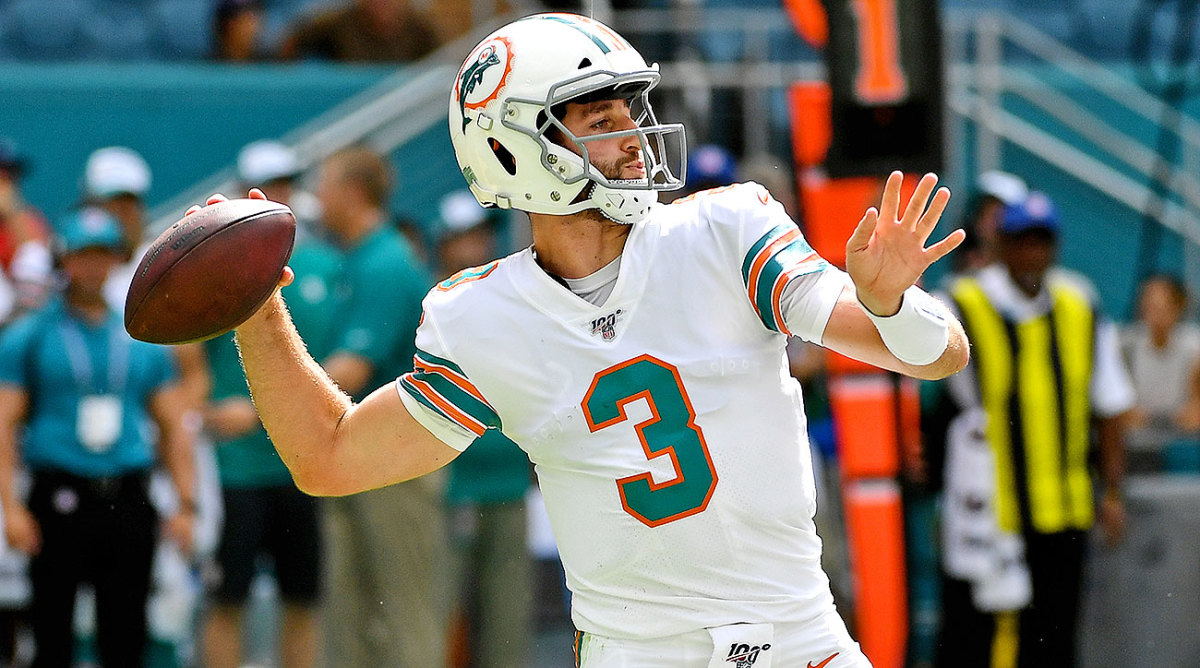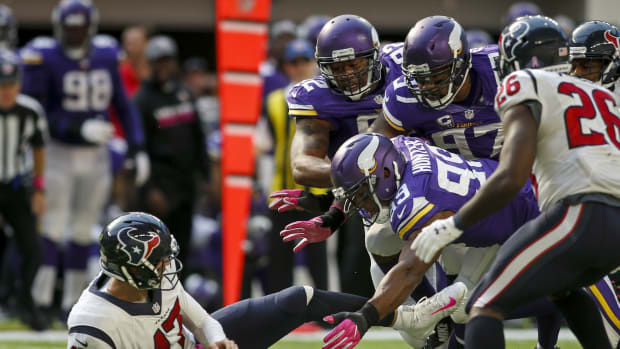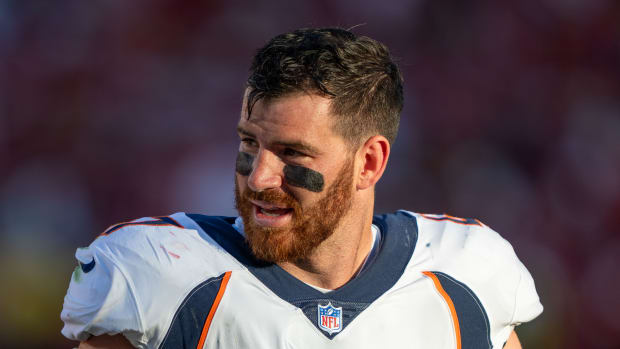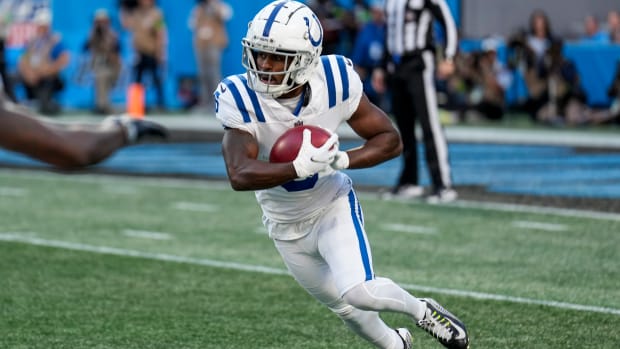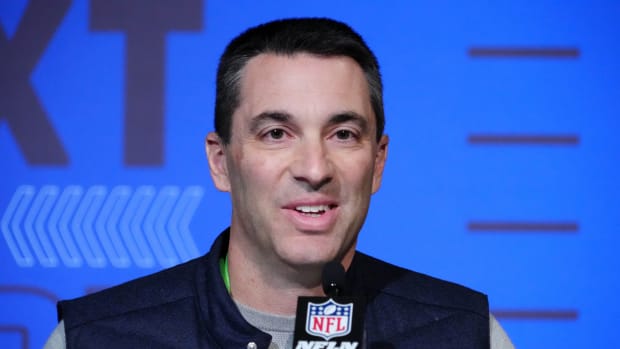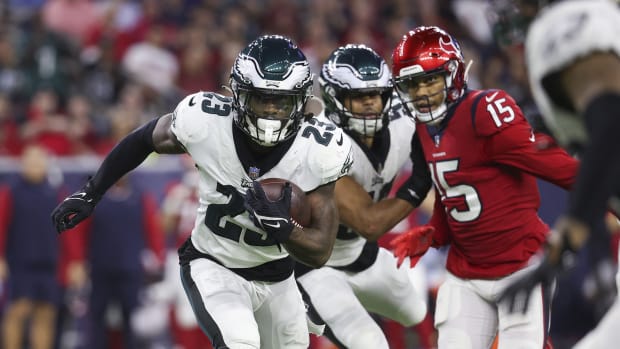Cautionary Tales for Dwayne Haskins and Josh Rosen
Brady Quinn remembers when the Dolphins passed on him with the ninth pick of the 2007 NFL draft, instead drafting Ted Ginn Jr. He remembers going to the bathroom after that, where he ran into the NFL’s new commissioner Roger Goodell. Goodell offered the Notre Dame quarterback, who was expected to be drafted in the top-10 and possibly with the first pick, refuge in his private green room. Quinn remembers turning Goodell down, then doubling back and taking him up on the offer; as his draft-day slide fell into the late teens, he wanted to give his family relief from the cameras.
But most of all, Quinn remembers when the Cowboys went on the clock at pick 22. A call came in from Baltimore. The Ravens had plans.
“Kansas City was at 23, and [the Ravens] were trading up to take me,” Quinn recalls. “So that team specifically, I always look back and say, ‘Wow, what a situation I’d have entered into, a team that had Hall of Fame-caliber players, a defense that was just nasty, didn’t force you to have win every game in a shootout. A good o-line, a good rushing attack, and an organization that drafts well and has a short-term plan and a long-term plan they can execute.
“So I probably talked to them for a solid 10 minutes ... And next thing you know, there’s two minutes left on that pick, and Cleveland traded up to 22 with Dallas and got me.”
Quinn has been out of the NFL for five years now, cut by Miami at the end of camp in 2014. He’s fine personally, working in TV now, co-hosting FOX’s college football pregame and mixing NFL game calls in with it. But there will always be a part of him that wonders what might have been.
A year after they just missed on Quinn, the Ravens drafted Joe Flacco, who as a rookie went to the AFC title game playing for first-year coach John Harbaugh, and then won a Super Bowl in Year 5 before inking a huge contract. He’s still playing, now in Denver, and has pulled down around $170 million over his career. He’s earned his money, to be sure, but also has had circumstance on his side.
Why is this relevant now? Quinn’s situation—circumstance working against him—serves as a cautionary tale for the two young quarterbacks on opposite sidelines at Hard Rock Stadium in Miami Garden this Sunday.
On one side is Dolphins’ Josh Rosen, and on the other is Redskins’ Dwayne Haskins. In a certain way, the future of both players is hanging in the balance, even if it may feel like they have time, and it’s controlled by so many other factors that’ll be in that building on Sunday with them.
***
Five NFL Sundays down, 12 to go and lots of sweeping conclusions to make. You’ll see some of mine this week, as I answer questions on …
• Todd Gurley’s usage.
• What separates a first-round quarterback from a second-rounder.
• The Cowboys’ long-term decision on Dak Prescott.
• The Giants’ long-term future.
• Trent Williams’ short-term future.
Plus, we have plenty of stuff on the trade deadline, now less than three weeks away. But we’re starting with a game that’s heaviest impact will likely come in the draft order in April, and two teams with promising young quarterbacks they have to be careful with.
***
Most failed first-round quarterbacks have their own version of Quinn’s Baltimore story.
Joey Harrington’s what-if was in Kansas City, and the-chance-that-could’ve-been to play for Dick Vermeil there, since the Chiefs kicked tires prior to the 2002 draft, and Harrington’s dad had played for a few of Vermeil’s assistants. Tim Couch still wonders what would’ve happened if Cleveland passed on him in 1999, and he’d have gone to one of the four others that took quarterbacks in the top 12 that year—Philadelphia, Cincinnati, Chicago or Minnesota.
“You look at what could’ve been if I was with Andy Reid in Philadelphia, or in Minnesota with Randy Moss and Cris Carter and Robert Smith, and all those guys,” Couch says now. “So certainly I think my career would’ve been different if I’d ended up in a different place. … I think it’s a natural thing to look back at your career once it’s said and done, and wonder what if you went to this place or that place.”
Now the question is: are Rosen and Haskins are doomed to that fate? Rosen was picked tenth by the Cardinals in the 2018 draft, got pummeled behind a bad offensive line in Arizona as a rookie, saw his offensive coordinator fired in midseason and watched his head coach get whacked after the season before being traded when the new Cardinals coach had eyes for another passer. Haskins, likewise, has already seen his first coach fired, which is just a part of the mess in Washington.
It’s easy to look at both players and say they still have time in their careers. But history shows that the clock is already ticking, and according to these quarterbacks who flamed out, missteps now could wind up being irreparable.
“When I was in Atlanta [in 2007],” Harrington says. “I was still trying to fix what happened to me in Detroit.”
Harrington’s biggest problem following his tumultuous start? “Doubt. Doubt. Lack of confidence is the death of you in the NFL.”
After detailed conversations with these former players, we came up with a list of things that could go wrong for Haskins and Rosen. And they helped to draw a roadmap of what lies ahead, and the potholes the quarterbacks, and their teams, have to avoid …
The wrong playing-time decision. There’s no blanket call to be made here. Some should play while others shouldn’t.
In his particular case, Couch thinks serious damage was done when the Browns coaches pulled his redshirt just a week into his rookie year, starting him in Week 2. He’d tell you he shouldn’t have been playing, ready as he might’ve have thought he was back then.
“I was physically ready,” Couch says. “But mentally, I don’t think I was, as far as handling myself at the line of scrimmage, handling the offense at line of scrimmage, getting in and out of plays and handling protections. In college, I didn’t do a lot at the line. … So I got hit a lot. And a lot of that was on me, not recognizing what was going on, getting myself picked off, not getting rid of the ball quickly. And, also, the offensive line was struggling.”
As the pounding added up, Couch became “A little gun-shy. The more you get hit in the league, it speeds the clock up in your head a little bit, you feel like you have to get rid of the ball quicker than you’d actually have to, it makes you want to get out of the pocket even quicker instead of sitting there.”
On the flip side, where Couch saw the damage done, Quinn saw a missed opportunity. He believed he actually was ready, having played for ex-Patriots coordinator Charlie Weis at Notre Dame, from a mental standpoint. And Cleveland’s situation in 2007 was as good as it’d been there since the Browns reentered the league in Couch’s first year. But Derek Anderson was the starter, made the Pro Bowl, and that was that.
“I felt great about the offense, felt great about what we were doing, [coach Rob Chudzinski] made it so easy,” Quinns says. ”There were a lot of things he was dialing up that made Derek’s season easy in 2007, and the way Braylon [Edwards] and Kellen [Winslow] played that year, and just our team as a whole, it was a great situation.”
Instead, he didn’t start until deep into his second year, and by then the Browns were coming undone and Chudzinski was on the doorstep of being fired. Eric Mangini replaced him in 2009, and Quinn’s status as the team’s future at the position was gone forever.
Coaching tumult. Couch, Harrington and Quinn all went thought head coaching turnover within two years of entry to the league. Both Haskins and Rosen have seen it up close, too. And that’s hard in more than one way.
“You look at a guy like [Tom] Brady who’s had [Bill] Belichick since the Roman Empire, and if the difference between success and failure in the NFL is a quarterback, it’s about being comfortable and confident and making timely, smart decisions,” Harrington says. “If you have an ability to spend a decade in the same system, you know it forward and backwards. And you’re trying to compare that to guys like Marcus Mariota this year? Or Rosen, how many head coaches and how many systems has he been in?
“It’s impossible to make the same quick decisions when you’re still trying to figure out what the plays are and who’s calling them.”
Also, a coach who didn’t draft a specific quarterback isn’t going to have the same level of investment in making that quarterback great. Quinn raised Rosen as an example. A year ago, he was playing for then-Cardinals coach Steve Wilks and GM Steve Keim, who’d traded up in the first round to get him. Now, he’s playing for a coach and GM who spend a late second-rounder to take a flier on him.
The difference? If it doesn’t work, Brian Flores and Chris Grier aren’t losing their job over it. They can just move on and draft Tua Tagovailoa or Justin Herbert next spring. And no one will care that Rosen dealt with bad situations in Arizona and Miami.
“[Rosen is] supposed to be able to overcome it all [in Arizona] because [he’s] a top 10 pick,” Quinn says. “It’s nuts. And unfortunately, that’s the first impression, of fans, of that team, the guys he played with, the people who played against him, the evaluators in the NFL. Then he gets traded for a second-round pick, and now he’s valued like that. He’s looked at as the guy who wasn’t good enough to make it work in Arizona. ... They’re all going to think he’s not good, not talented, just because of that first impression. And that’s the difficulty, overcoming that.”
The physical toll. They may not have conceded it at the time, as they moved from face-of-the-franchise status to fighting to stay in the league, but two of these three players were chased from the game by injuries. Quinn’s back, foot and concussion issues were a prelude to his end. Couch says he had “two major shoulder surgeries, a broken thumb, a broken leg, a broken ankle, concussions,” and after the latter shoulder surgery, “I was half of myself.”
As for Harrington, the mental toll of what he went through over a half-decade in pro football sapped the enjoyment from it. He’d saved his money and simply wanted to preserve his health and quality of life. So avoiding what others went through served as motivation, after being lucky to survive the beating he took.
“I had more important things in my mind, which was the success and health and longevity of my family,” Harrington says. “I’m able to play catch with my kids, I’m not physically unable to move. I can coach basketball. I don’t have significant cognitive problems right now. So I think to come at it from that perspective is a little short-sighted. It was an incredible earning opportunity to play a game, but I always knew it was a game.”
At the same, he knows if his experience had been different, the result might’ve been too—“The most important thing for the development of a young quarterback is to allow them to establish that comfort, that confidence. And if you do, you can reap the rewards for the next decade. And if you don’t, like so many of us, you’re gonna be chasing your tail until you finally say, ‘enough.’”
***
It’s a fragile future for two quarterbacks playing in a game Sunday that very few people outside of the Washington and Miami markets will watch. And that a big part of where Rosen and Haskins wind up five years from now isn’t even up to them.
“Take a round number—say 50 guys in the NFL,” Harrington says. “With the exception of Drew Brees and Tom Brady, Aaron Rodgers and Peyton [Manning] when he was playing. ... There’s 50 guys who can make every single throw, can make every single read, can do everything necessary to be an NFL quarterback, and circumstances determine the trajectory of their career.
“The difference between, say, Ben Roethlisberger and Brady Quinn [is that] Ben came into a situation where he was able rely on a running game, where we had a defense to support him. And I think if you go back and look at his first-year stats, I think there was only one game, maybe two, where he threw more than 20 passes. They allowed him to build his confidence. They allowed him to establish a foundation.”
As was the case with Harrington and Couch, and thanks to a simple twist of draft-day fate, Quinn never got that chance. Time will tell whether Rosen and Haskins do.
***
WEEKEND WATCH LIST
Chiefs DE Frank Clark: Last week, we saw what the Texans can be if a new-look offensive line plays to its potential—and the rest of the league should take notice, because it sure did look like it elevated Deshaun Watson and Will Fuller to another level. A team trades for Frank Clark to disrupt that. All that’s standing in Clark’s way is big-ticket left tackle Laremy Tunsil.
Vikings QB Kirk Cousins: Cousins has played well in two of his last three games, and the Eagles this week gives the Vikings offense a chance to prove it’s turned the corner. He’ll have to navigate through an aggressive Philadelphia rush, but the matchups on the outside, with Stefon Diggs and Adam Thielen facing a banged-up Eagles secondary, should be there for Minnesota.
Rams OLBs Dante Fowler: Fowler’s off to a solid start, and becomes an even bigger piece with Clay Matthews down. And if the Rams defense is gonna bounce back from the loss to Seattle, it should begin with him, especially with the Niners going without Joe Staley and Mike McGlinchey. Some sack production would be nice. But helping put the brakes on the Niners vaunted running game will likely be even more important.
Panthers RB Christian McCaffrey: A PSA: If you aren’t watching McCaffrey every week yet, start now. He might be the best player in the league.
Browns LT Greg Robinson: It looks like the Browns are going to have to do something to solve their tackle problem. And if he has another couple of outings like Monday night, it’s hard to imagine that wouldn’t include getting Robinson off the field. Next up? Ziggy Ansah, Jadeveon Clowney and the Seahawks.
***
TWO FOR SATURDAY
Florida CB CJ Henderson (at LSU, CBS, 8 p.m. ET): The Gators’ recent history with highly-drafted defensive backs has been a little spotty, but Henderson has flashed potential and played his way into the first-round discussion at corner. In his third year as a starter, he’s probably the best player on Florida’s roster. Last year, quarterbacks completed just 43% of their passes throwing at him, per Pro Football Focus, and he didn’t allow a single touchdown.
“Very good athletic ability and speed, just a natural cover corner with ball skill, an easy mover,” one AFC exec says. When asked if there’s a big knock, the exec responded, “Not really. Some may question how physical he is as a tackler. But he will come up in support and can cover ground.”
And when we get to April, this Saturday’s tape, the LSU tape, will probably be the first that scouts pop in. The Tigers passing game is rolling, and receivers Ja’Marr Chas and Justin Jefferson are stars in it.
Oklahoma WR CeeDee Lamb (vs. Texas, FOX, Noon ET): This neutral-site rivalry game has plenty of intrigue, and Lamb will be center stage as the teams play something of a rubber match off 2018 (Lamb caught 12 balls for 242 yards and two scores in two games against the Longhorns last year). And the 6' 2", 191-pounder will also be playing to enhance his stocks in front of NFL types, who’ve had him on the radar for a while.
“Awesome body control and change of direction, he’s just a really natural, easy moving athlete,” one AFC college scouting director says. “Very good route runner with good hands. He’s kind of a glider and it looks pretty effortless at times when he’s running. And he’s can jump and make all the acrobatic catches and all that. I’m not sure his top-end speed is anything to get excited about. He’s not slow, but that extra gear that the blazing fast guys have, he doesn’t quite have that.”
An NFC exec affirmed that, calling Lamb, “big and physical, and strong after the catch.” He’s been a little up and down this year, and this is one of those weeks that could help push him from being a likely second-round pick into the bottom of the first round, with how he runs in the spring also expected to be a factor.
***
MAIL TIME!
From Knowingly (@KnowinglyFair): Todd Gurley—is he really healthy to play?
Let’s take a look at Gurley’s touches in the first five games of the season over the last three years:
2017: 24, 19, 33, 30, 16
2018: 23, 22, 28, 21, 26
2019: 15, 19, 14, 12, 18
Gurley is getting the ball a little less than he has in the past so far this season. The 25-year-old back has had medical issues in the past, coming into the league with a degenerative condition in his knee, and last year didn’t end the way anyone wanted it. Put it all together, and it’s clear the Rams are trying to have him peak closer to the end of the season.
I don’t think the Rams, or Gurley himself, are 100% what sure what lays ahead and have approached it as such, which means it’s a play-it-by-ear situation.
From Chi Cheong Ho (@chicheongho): In your most recent "Six From Saturday" column re: Joe Burrow, what qualifies someone to be drafted in the first vs. second round?
I think for quarterbacks there’s a huge difference. Second-round quarterbacks, generally, are guys who have some high-end traits but also significant flaws. And taking a player there doesn’t handcuff a team to that player long-term.
This decade, 10 quarterbacks have been drafted in the second round: Drew Lock, DeShone Kizer, Christian Hackenberg, Derek Carr, Jimmy Garoppolo, Geno Smith, Brock Osweiler, Andy Dalton, Colin Kaepernick and Jimmy Clausen. Four players became entrenched starters (Kaepernick, Dalton, Garoppolo, Carr), and three others whose teams drafted a quarterback in the first round either a year (Clausen, Kizer) or two (Hackenberg) later.
That’s the beauty of drafting a quarterback in the second round—a team is taking a swing at a starter without marrying itself to him. If a team takes one in the first round? They’re hitched.
From Happy (@J_Rizzle87): What should the Cowboys pay Dak Prescott as of today? Should they pay him?
Yes, the Cowboys should pay Prescott because the team is in such a win-now position, with so many core players entering their primes, and it would be really, really hard to start over at that spot now. What does he get? Somewhere in the Jared Goff/Carson Wentz contract range. Neither of those guys topped Russell Wilson’s $35 million per, and while I know the Cowboys would be reluctant to do so, they’ve already gone past $30 million per.
The bigger question is what Prescott should do. Structure and guarantees should be a priority, and tie the team to him for at least three years. Short of that, it might make sense for Prescott to take a page out of Cousins’ 2016-18 playbook, and force the team to franchise him twice, with an eye towards free agency in ’22.
While we’re here, one interesting option for contending teams that want to get creative at quarterback: Josh Rosen. I still think the guy has ability, and don’t think it’s crazy to think a team that might be reluctant to break the bank on their own young quarterback would kick the tires on trading for him this offseason as an alternative. Rosen makes $2.08 million next year, and $2.88 million next year.
From Mike (@mikeschwartzacc): How long do you think the Giants are away from being a contender assuming Jones is the real deal at QB?
Mike, I’d say contending in 2021 would be a realistic goal. GM Dave Gettleman’s done good in getting the offensive line back to competency, and three of his first-round picks—Daniel Jones, Dexter Lawrence and, of course, Saquon Barkley—look like hits (we’ll see on DeAndre Baker). But there’s still significant work to be done on defense, and really in every position group, and also at receiver.
I think after two more drafts, and two free agent cycles, they can get there. Particularly if Jones is the real deal at quarterback.
From Anthony (@a2low11): Is Trent Williams going to get traded? With the 49ers missing both tackles is he a realistic option?
Anthony, I still don’t think Trent Williams gets traded, but I’m not slamming the door on it yet. And if there’s one past situation I’d compare this one to, it’d be Carson Palmer in 2011. The Bengals weren’t entertaining trading him as a matter of principle—and I think this is a matter of principle for the Redskins, given the problem involves their medical team, too. When did Cincinnati back down? When Oakland blew them away with first- and second-rounders for Palmer. So I think the Redskins would have to be similarly blown away.
And I don’t think the Niners will swooping in with that sort of offer, even though Kyle Shanahan had Williams when he was Washington’s OC. If there’s a team that does it, I think it would have to be a New England or Cleveland, that would be in position to give him the job permanently. To give up what it’d take to get him, that would almost have to be the idea.
From J.J. (@johnjosephmckay): Three-part question: 1. Have you met Daniel M. Snyder? 2. Did he allow you to look him in the eyes? 3. Did he make you call him "Mr. Snyder"? #FireBruceAllen
JJ, I have met Daniel Snyder, and I do believe I looked him in the eye. I really don’t refer to any of the owners as “Mister.” We’re all adults here, no need for excessive adulation.
From Eric Morganti (@eric_morganti): Any tight end trade targets for the Patriots?
Eric, two names I’d keep an eye on for the Patriots—Cincinnati’s Tyler Eifert and Atlanta’s Austin Hooper.
Eifert is a capable TE who has played in all five of the Bengals’ games. He was recruited to Notre Dame way back in the day by Bill Belichick’s old pal, Charlie Weis, giving him a little experience in the system. I don’t think Cincy’s going to conduct a fire sale, but it certainly can’t hurt to ask.
Hooper is a legit rising star (34 catches, 363 yards, two touchdowns through five games) who doesn’t turn 25 until next month and will be a free agent in March. If I’m the Patriots, I’m willing to fork over a real draft pick for him. And with a couple more losses, I could see where Atlanta might consider it, especially if they’ve decided that Hooper might not get extended, amid the contractual traffic jam of young players coming up they’ve got.
If they go 1-2 in their next three (at Cardinals, vs. Rams, vs. Seahawks), they’ll be 2-6. And while I’m not sure who at that point they be willing to deal, if anyone, I’m sure calls would come in on guys like Hooper, Mohamed Sanu, De’Vondre Campbell and Vic Beasley.
From Hulkeinstein (@Hulkeinstein14): Who is one big-name guy who is barely mentioned, but can easily be traded by the deadline?
Jets’ Leonard Williams. He’s making $14.2 million, and he isn’t necessarily the best fit for Gregg Williams defense. And he’s been a Pro Bowler, having made it in his second year in Todd Bowles’s defense. I’d think he’d be attractive to a team like the Eagles or even the Packers or Chiefs, given their current situations.
Another Jet who would be logical to try and move is Le’Veon Bell. His contract is trade-friendly—he’s only making $2 million in base salary this year, so a team would inherit a proration of that, plus the obligation to pay his per-game roster bonuses. The price is $13.5 million for 2020, so that’s the other side of it, but you’d at least have a runway to prepare for that. And the question of who really wanted him has lingered.
I’d probably lean towards keeping Bell, because of what it might mean for a young quarterback, but I could understand moving him too.
From Dustin Schandevel (@D_Schandy24): If the Lions beat the Packers on Monday night, how realistic would it be to think they could win the NFC North this year?
Dustin, I think they’re a realistic contender for two big reasons you may not be looking at right now: the offensive line and the defensive line. They’ve invested in both. Between Taylor Decker, Frank Ragnow and Ricky Wagner on one side, and Trey Flowers, Snacks Harrison and Mike Daniels on the other, these have become strengths. And when you’re strong on the lines, you’re usually gonna be in every game.
Then, there’s the quarterback who, I’m telling you, is very well-respected around the NFL, and has a GM and coach building it for him, not just around him. I think Lions fight all the way through, and have a pretty decent shot against a really good Packer team on Monday.
From Bryan Gnieski (@gnieskib): With a shift towards analytics and the evolution of offenses, which in turn causes an evolution in defenses, do you see any changes being implemented to the scouting combine drills? I’d imagine now all analytics care about 30 reps on bench, and Wonderlic may be antiquated by now.
No, Bryan, and we’ll wrap it up here—I think combine drills aren’t changing any time soon, even if some of them are antiquated. Why? The data collection. Teams now have over three decades of objective testing results, and apples-to-apples results (for the most part) at that. So a coach or a scout can take, Saquon Barkley, and compare his athleticism right down the line to, say, Barry Sanders and Emmitt Smith.
There’s great value in that. Blow it up, and you’re basically starting all over in that area.
Question or comment? Email us at talkback@themmqb.com.
































